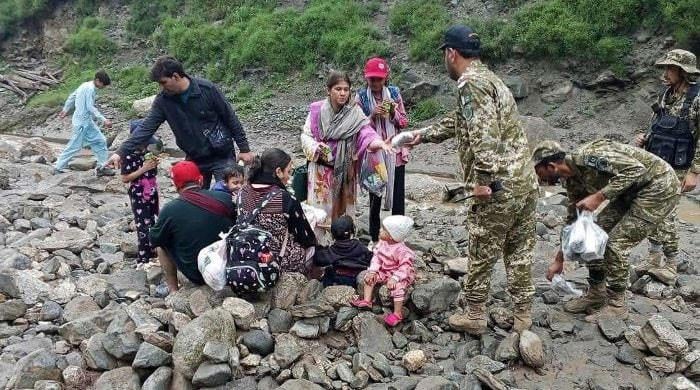Climate Disasters Devastate Gilgit Baltistan
Gilgit Baltistan has suffered significant damage from recent climate-related calamities, according to Chief Secretary Abrar Ahmed Mirza. Over the past two weeks, these disasters have resulted in at least nine confirmed fatalities, impacted over 200 residences, and severely damaged essential infrastructure.
The region, situated in northern Pakistan, has experienced severe weather events, including glacial melting, heatwaves, and substantial rainfall, which have led to severe flash floods and mudslides.
During a press briefing on Thursday, the Chief Secretary explained that the area initially dealt with glacial melt and heatwaves, followed by intense rainfall that triggered flash floods and landslides, particularly in the Diamer and Astore districts.
“Since June 10, nine deaths have been verified, with eight occurring in the valleys of Thak and Thor in Diamer, and one in the Astore valley,” he stated.
The Chief Secretary emphasized that the majority of incidents stemmed from glacial lake outburst floods (GLOFs), an increasingly prevalent phenomenon attributed to rising temperatures and climate change. He noted, “We are observing the combined effects of extreme heat and irregular rainfall.”
He reported that the floods have damaged approximately 200 homes, disrupted roadways and water systems, and isolated several villages in the Kharmang district due to bridge collapses. “All ten districts of Gilgit Baltistan have been affected to varying degrees, with Diamer being the most severely impacted,” he added.
Mirza stated that the government promptly initiated rescue efforts in partnership with the Pakistan Army, GB Scouts, district administrations, and Rescue 1122, aided by local volunteers. Additionally, stranded tourists were evacuated via army helicopter from remote locations. While acknowledging that travel advisories are regularly issued for high-risk zones, he pointed out that public compliance remains insufficient, noting, “People often wait until the danger is imminent before changing their travel plans.”
He cautioned that the death toll could increase, as several vehicles remain missing, and the discovery of four to five more bodies is anticipated during ongoing recovery operations. The GB government is actively assessing the total extent of the damage and has committed to restoring blocked routes and providing aid to displaced families.
In related news, at least six individuals lost their lives, and five others sustained injuries due to heavy rainfall across the nation in the last 24 hours. This brings the country’s total death toll from the monsoon season to 258, according to the National Disaster Management Authority (NDMA).
The NDMA announced on Thursday that three of the deaths occurred in Khyber Pakhtunkhwa, where five people were also injured. Rain-related incidents also resulted in two fatalities in Islamabad and one in Sindh.
The deceased include 89 men, 46 women, and 123 children, while the injured consist of 243 men, 170 women, and 203 children, underscoring the broad human impact of the ongoing weather crisis.
The rains have also caused considerable damage to property and livestock. In the past 24 hours alone, 22 homes were reported destroyed, and 36 livestock animals died. Since the start of the monsoon season, a total of 1,027 houses have been destroyed, and 364 animals have perished.



Comments (0)
No comments yet. Be the first to comment!
Leave a Comment